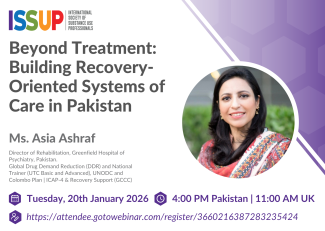Applying interventions designed to reduce and manage the symptoms of substance use disorders.
Treatment
INEBRIA–ICUDDR Thematic Meeting 2026
For the first time, the International Network on Brief Interventions for Alcohol and Other Drugs (INEBRIA) and the International Consortium of Universities for Drug Demand Reduction (ICUDDR) will co-host a thematic meeting in Africa focused on the future of Screening, Brief Intervention, and Referral to Treatment (SBIRT) across the continent, in collaborat
Annual Global ISAM Conference 2026
On behalf of the International Society of Addiction Medicine, the Netherlands Society of Addiction Medicine and NOVA Postgraduate Training Institute for Addiction Medicine, we welcome you to the XXVIII ISAM Congress in Rotterdam, the Netherlands.
Navigating Ethical Boundaries: Decision Making for Peer Support Specialists and Addiction Counselors
This interactive training covers the 2025 updates to the NAADAC Code of Ethics and provides practical tools for ethical decision-making in behavioral health. Using real-world case studies, participants will explore boundary management, dual relationships, ethical self-disclosure, and strategies to prevent burnout and countertransference.
How to Conduct a Quality Substance Use Evaluation Education Free Webinars 2026 January - March Webinars
Substance use disorders (SUDs) are common, affecting at least 1 of 3 adult Americans at some point in their lives. One of the many characteristics of SUDs that makes them unique is that the nature of the addictive process is such that denial, minimization, and lack of insight are natural components of the development of the disorder.
EMPOWER 2026: NAADAC Annual Conference
We cordially invite you to submit a proposal to present at the EMPOWER 2026: the Annual Conference for NAADAC, the Association for Addiction Professionals. The 2026 Annual Conference will be held on August 29-31, 2026, in Kansas City, MO, at the Sheraton Kansas City Hotel at Crown Center.
Beyond Treatment: Building Recovery-Oriented Systems of Care in Pakistan
Beyond Treatment: Building Recovery-Oriented Systems of Care in Pakistan

10th World Congress of World Association on Dual Disorders
It is an Association created to professionals in psychiatry and mental health dedicated to the Research and Treatments on Dual Disorders.
To plan and develop the required educational programs to manage the “Dual Disorder’s” concept at a worldwide level with a focus on professional education and capacitation.
17th European Congress on Heroin Addiction & Related Clinical Problems
The 17th European Opiate Addiction Treatment Association (EUROPAD) conference will be held in Bucharest, Romania on May 29-31, 2026.
Symposia have a central theme around which the EUROPAD2026BUCHAREST scientific committee has identified topics. The structure of the symposium will take the shape of 3 presentations with 30 minutes per presentation. The length of each symposium is 90 minutes.